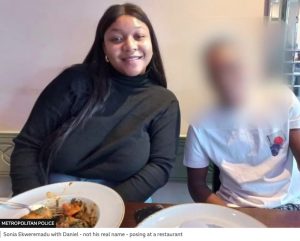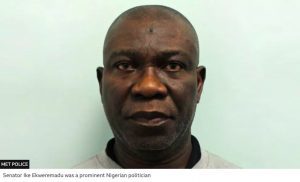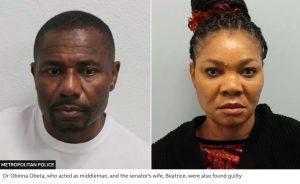When a man who’d been sleeping rough walked into a police station near Heathrow Airport, it would lead to the UK’s first prosecution of human trafficking for organ removal. The BBC has been given unprecedented access to the Metropolitan Police team that investigated this historic case.
Daniel was about to get the fright of his life.
He was sitting in a consulting room at the Royal Free hospital in London, speaking to doctors with his limited English.
The 21-year-old street trader from Lagos, Nigeria, had come to the UK days earlier for what he had been told was a “life-changing opportunity”. He thought he was going to get a better job.
But now doctors were talking to him about the risks of the operation and the need for lifelong medical care.
It was at that moment, Daniel told investigators, that he realised there was no job opportunity and he had been brought to the UK to give a kidney to a stranger.
“He was going to literally be cut up like a piece of meat, take what they wanted out of him and then stitch him back up,” according to Cristina Huddleston, from the anti modern slavery group Justice and Care.
Luckily for Daniel, the doctors had become suspicious that he didn’t know what was going on and feared he was being coerced. So they halted the process.
Daniel was not free of his traffickers though. Back in the flat he was staying in, two men came to examine him. It was then he overheard a conversation about sending him back to Nigeria to remove his kidney there.
He fled, and after two nights sleeping rough, he walked into a police station near Heathrow, triggering an investigation that would lead to the UK’s first prosecution for human trafficking for organ removal.
That was in May 2022, and Daniel – not his real name – now lives under heavy police protection. The BBC’s File on 4 has learned that his ground-breaking case alerted UK authorities to other instances of organ trafficking. These include:
- The case of an Indian man in his 60s who has been arrested in the UK on suspicion of conspiring to exploit a person for organ removal. He was arrested earlier this month and released on bail
- A case referred to police by the Human Tissue Authority, which must approve living organ transplants in the UK, after it refused to give the go-ahead
- A “handful” of other referrals to police by the authority, of people it suspects have returned to the UK after having illegally paid for transplants abroad
- Meanwhile, the Met Police says it is still investigating “other outstanding suspects” from its original investigation.
Trafficked
Daniel’s case reveals the tactics used by traffickers to lure people to the UK under false pretences.
When Daniel was first offered the chance to work in the UK, while he was still in Nigeria, he was asked to go for a blood test. He thought it was for his UK visa, but it was really to check that his body was healthy enough to have his kidney removed.
He was then put on a flight to London – but had no money and wasn’t allowed to touch his passport. His every move was now being controlled.
His traffickers then introduced him to the young Nigerian woman who was hoping to get his kidney.
Sonia, who was 25 at the time, has a serious form of kidney disease. She needs a transplant and is on dialysis for five hours a day, three or four times a week.

A photograph of their meeting was taken as evidence of their relationship – he was being presented as her cousin, a willing donor for his family member.
That’s because while it is legal to offer an organ to someone else – you cannot do it for financial reward.

What is organ harvesting?
- Organ-harvesting involves illegally removing parts of the body for transplant, often for commercial gain, with or without the victim’s consent. Under modern slavery laws a victim cannot consent to their own exploitation
- It often involves coercion, deception or a promise of a reward for vulnerable victims
- The UK’s Modern Slavery Act 2015 covers human trafficking, under which organ harvesting falls. It is punishable with a maximum sentence of life imprisonment




Daniel was taken to several meetings with medical consultants at the private patients’ unit at London’s Royal Free Hospital. An interpreter was also paid to coach Daniel to say whatever the doctors needed to hear.
But the deception failed and Daniel went to the police.
His testimony led detectives to Sonia’s father, one of Nigeria’s most powerful politicians.
Ike Ekweremadu was a senior senator and a multi-millionaire, who was paying for his family to be schooled in the UK.
At his trial earlier this year, Ekweremadu said he had been misled and never intended to exploit Daniel. In fact the jury heard the defendant had helped introduce laws that made organ donations for reward a criminal offence in Nigeria.


Middleman
In court, it emerged that Daniel was not the only person to have been brought to the UK to have their kidney taken. Another transplant – also illegal – went ahead in 2021.
The man who received that organ for himself was in fact in the dock, along with the Ekweremadus – Sonia’s parents. He was their middleman, Dr Obinna Obeta, who had orchestrated Daniel’s exploitation.
Dr Obeta knew what the process involved because his own transplant had also taken place at the Royal Free Hospital.
On sentencing, Mr Justice Johnson, referring to that first operation, put it bluntly: “The clinicians at the Royal Free, and the independent assessors at the Human Tissue Authority, were taken in by the lie.”
The lie was that the transplant in 2021 was carried out on the understanding that the donor and recipient were cousins. In fact, it turned out they were not related.


The trial also heard that although Daniel’s transplant had been stopped, nobody from the Royal Free had informed the police of their concerns – which meant Daniel had remained at risk.
The Royal Free Hospital told us it had followed the official guidance in Daniel’s case and “as such a decision was taken not to proceed”.
The hospital also said it continues “to work closely with the Metropolitan Police to ensure all those working in our transplant services are aware of the law around organ trafficking and know what to do if they suspect a crime has been committed”.
Transplant tourism
In July last year, having a paid-for transplant abroad became an offence in England, Scotland and Wales. All clinicians in Great Britain are now legally required to report any individuals who have returned and come to them seeking aftercare.
Birmingham-based kidney specialist Dr Adnan Sharif says it is a hard crime to prove “but we know that it happens” – citing recent NHS research showing there have been about 150 recorded cases of people returning to the UK over a 10-year period. Most instances were kidney transplants.
We asked The Human Tissue Authority (HTA) how many cases they have referred to police since the law changed last July.
Chief executive Dr Colin Sullivan told us a “handful” of cases have been referred – adding that a number of those were flagged by doctors and other clinicians.
He said the HTA has now changed guidance to staff, as well as its IT systems, to flag higher risk cases more easily.
“What does guilty mean?”
Modern slavery cases are often very difficult to prove.
In Daniel’s case, the Met officers expected the investigation to last years, because the culprits had left the country.
But, on 21 June 2022, Det Sgt Andy Owen received a phone call telling him that Ike Ekweremadu and his wife Beatrice were flying into London.
He quickly scrambled his team to get to Heathrow, and armed officers escorted the couple from the plane.
Seizing the suspect’s mobile phones, the police were able to uncover the plot. Vital evidence included messages about a donor fee of 4.5 million naira (£4,317 or $5,487).
“It was like a treasure chest,” Det Sgt Owen told us. “I was just finding more and more incriminating evidence.”
But dealing with such a powerful suspect wasn’t straightforward.
Midway through the investigation, Nigerian senators attempted to move the trial to Nigeria.
They also wanted to “have access to the victim”, said Det Supt Andy Furphy, “which obviously raises huge red flags for us. We immediately felt the victim was unsafe.”
After seeking legal advice, police were able to ensure that access was denied.
File on 4 spoke to the senator who led the delegation, Adamu Bulkachuwa, who visited Ike Ekweremadu in prison. He told us he had wanted to put “both diplomatic pressure and executive pressure on the British government to see if we can save the situation”.
But Mr Bulkachuwa insisted it was not to give his colleague an “easier ride” back home, explaining that “we are also signatories to the human trafficking laws internationally”.
On 23 March the three people involved in Daniel’s ordeal were found guilty. Ike Ekweremadu was sentenced to nine years and eight months in prison. His wife Beatrice got four and a half years. The middleman, Dr Obeta, was sentenced to 10 years.
Sonia was found not guilty.
Det Sgt Owen was in court with Daniel.
“He actually said, ‘What does guilty mean?’ That’s the level of understanding of the criminal justice system that he had.”
That response, along with the victim’s refusal to accept compensation from the perpetrators, offered a very different picture to people who saw “a young man just out for himself… to get as much money as he could,” says Det Sgt Owen.
He told the BBC Daniel was happy at being believed, and just wanted to move on with his life.
Broken family
Back in Nigeria, this episode has been nothing but heartbreak for Daniel’s loved ones.
They now fear revenge attacks from allies of the powerful Nigerian politician he has jailed.
We met Daniel’s brother in the busy Lagos market where Daniel used to sell mobile phone accessories.
He told us he hasn’t spoken to his brother since he suddenly disappeared in February 2022 and only found out where he was when news of the trial was reported months later.
“We’ve been crying every day and my father has grieved so much he’s become very sick,” he says.
“Daniel was deceived and carried away.”
Daniel’s landlord and mentor, who he spoke to every day before he vanished, is adamant he would not have agreed to sell his kidney.
“Because he knows there are other ways to make money. Even for £1m he wouldn’t have done it,” he said.
Daniel is now afraid for his safety. He is under police protection in the UK and feels he can’t return to Nigeria. He may never see his family again.
He saved his kidney and made legal history, but his life has been torn apart.




If you, or someone you know, may be a victim of modern slavery or trafficking, there are confidential helplines:
- Salvation Army (24 hour) 0800 808 3733
- Modern Slavery Helpline 08000 121 700
- You can also report to the Met police online or call 101
- And the Crimestoppers webite or call 0800 555 111
File on 4: The organ harvesters is at 20:00 on BBC Radio 4 – or listen now on BBC Sounds
